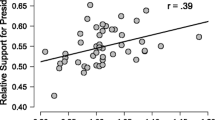Abstract
A speaker often decides whether or not to saysomething based on his assessment of the impact itwould have on his hearer's beliefs. If he thinks itwould bring them more in line with the truth, he saysit; otherwise he does not. In this paper, I developa model of these judgments, focusing specifically onthose of vague sentences. Under the simplifyingassumption that an utterance only conveys a speaker'sapplicability judgments, I present a Bayesian model ofan utterance's impact on a hearer's beliefs. Fromthis model I derive a model of a speaker's judgment ofwhether or not an utterance would be informative. Iillustrate it with several examples of judgments ofvague and non-vague sentences. For instance, I showthat it models the common judgment that assertingeither ``George is tall'' or ``George is not tall'' wouldbe misleading if George were borderline tall, butasserting ``George is tall and he isn't tall'' would notbe.
Similar content being viewed by others
References
Black, M.: 1937, 'Vagueness: An Exercise in Logical Analysis', Philosophy of Science 4, 427–55.
Chierchia, G. and McConnell-Ginet, S. (1989) Meaning and Grammar: An Introduction to Semantics, MIT Press, Cambridge, MA.
Goguen, J. A.: 1969, 'The Logic of Inexact Concepts', Synthese 19, 325–78.
Hersh, H. M. and A.: 1976, 'A Fuzzy Set Approach to Modifiers and Vagueness in Natural Language', Journal of Experimental Psychology: General 105(3), 254–76.
Kamp, J. A. W.: 1975, 'Two Theories about Adjectives', in E. Keenan (ed.), Formal Semantics of Natural Languages, Cambridge University Press, Cambridge, pp. 123–55.
Kyburg, A. I.: 1994, Belief, Assertability, and Truth: Pragmatic and Semantic Accounts of Vagueness, Dissertation. University of Rochester.
Kyburg, A. and M. Morreau: forthcoming, Linguistics and Philosophy.
Kyburg, A. and M. Morreau: 1998, 'Vague Utterances and Context Change', in H. Bunt and R. Muskens (eds.), Computing Meaning: Current Issues in Computational Semantics, Kluwer Academic Publishers, Dordrecht/Boston.
Pelletier, J. P.: 1988, The Good, the Bad, and the Ugly, presented at the Philosophy Colloquium Series at the University of Rochester.
Schubert, L. K.: 1978, 'On the Representation of Vague and Uncertain Knowledge', Abstract 37, Information Abstracts of the 7th International Conference on Computational Linguistics, University of Bergen, Norway.
Schubert, L. K.: unpublished, Vague Adjectives: A Probabilistic Approach.
Zadeh, L. A.: 1978, PRUF - A Meaning Representation Language for Natural Languages, Int. J. Man-Machine Studies 10, 395–460.
Author information
Authors and Affiliations
Rights and permissions
About this article
Cite this article
Kyburg, A. When Vague Sentences Inform: A Model Of Assertability. Synthese 124, 175–191 (2000). https://doi.org/10.1023/A:1005200520511
Issue Date:
DOI: https://doi.org/10.1023/A:1005200520511




